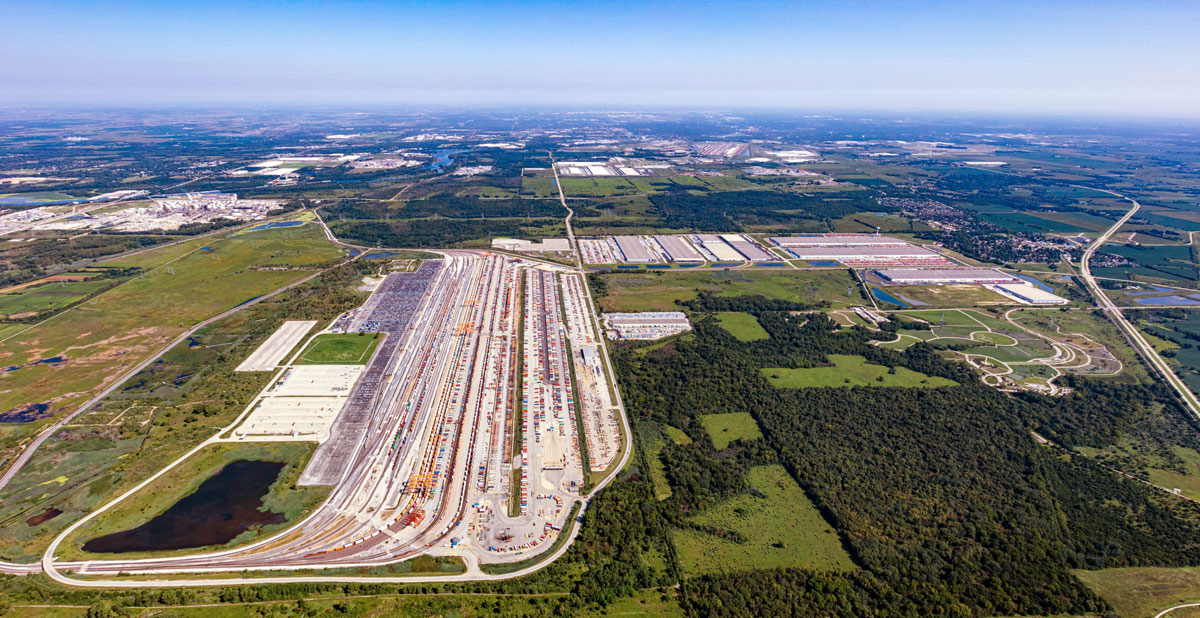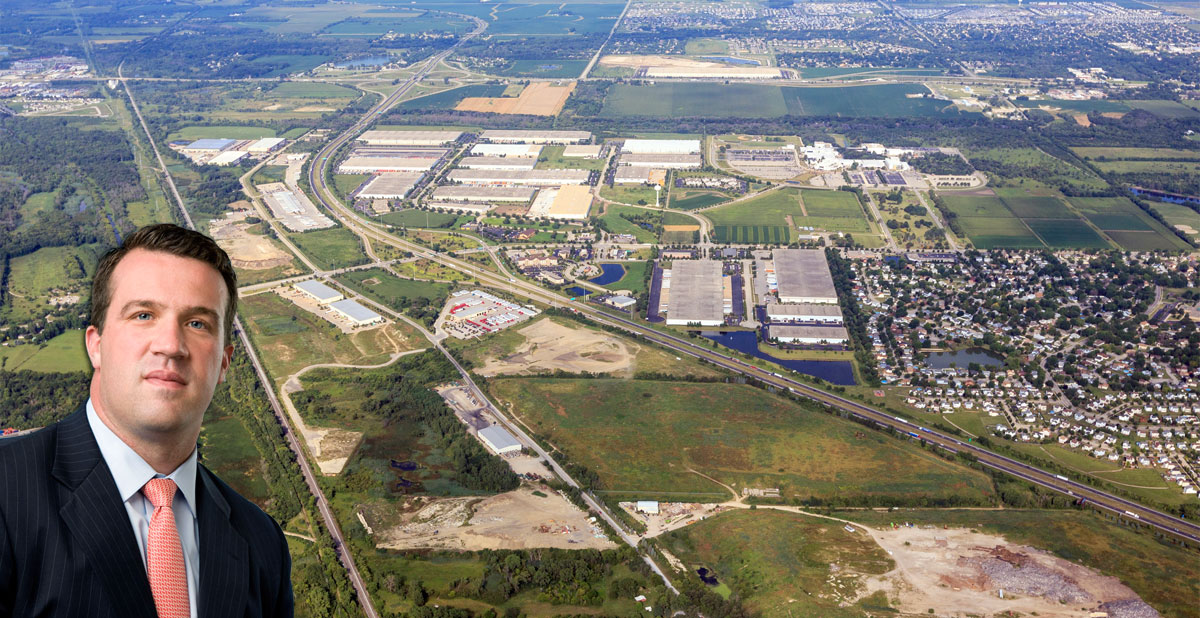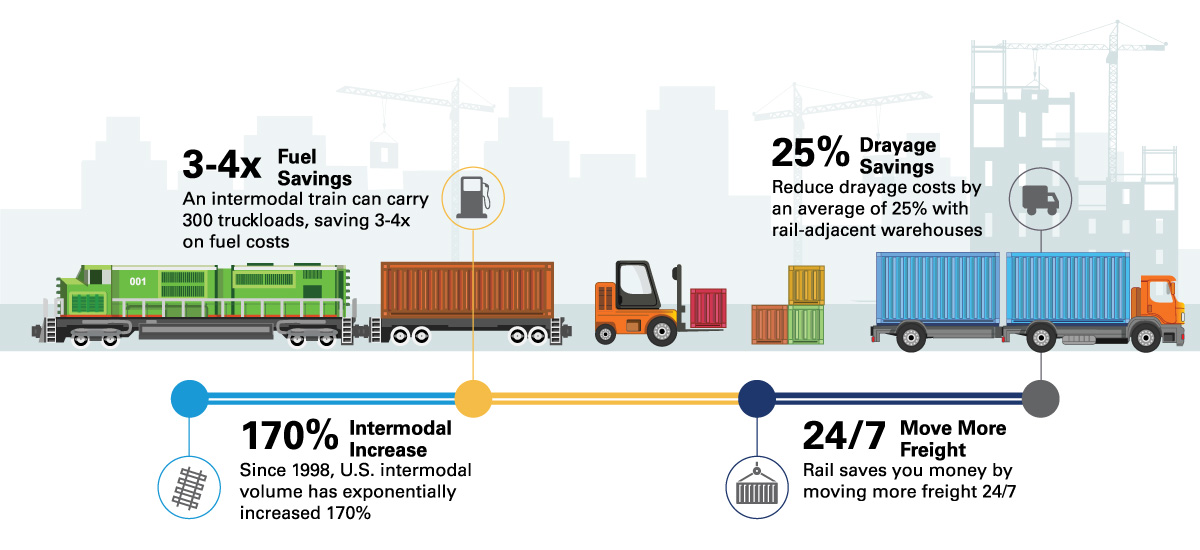CenterPoint offering timely cost savings with North America’s largest inland port
As shippers in a pandemic-impacted world place growing emphasis on cost-efficient supply chains, they increasingly are turning to CenterPoint Intermodal Center-Joliet – North America’s largest inland port – to provide the ideal solution.
Strategically situated 40 miles southwest of Chicago, the 6,400-acre CIC-Joliet complex has seen several million additional square feet put into active use over the six months since the world was jolted by the COVID-19 pandemic and economic aftershocks, and, according to Brian McKiernan, senior vice president of CenterPoint Properties, more than 1 million square feet of warehouse and distribution space remain available for lease at the center.
“Whether it’s the pandemic itself or the related recession, these kinds of macro global events tend to drive more shippers and third-party logistics providers to look at enhanced supply chain efficiencies,” McKiernan told AJOT.

Lower landed costs realized
“As companies become more and more cost-focused, I think we’ll see even more tenants seeking to benefit from a lower total landed cost,” McKiernan added, citing reductions in drayage and demurrage costs. Companies can also realize considerable environmental sustainability benefits by taking truck miles off roadways as shipments move greater distances via rail.
According to figures from the Association of American Railroads, moving freight by rail on a 24/7 basis saves money for shippers, who furthermore are able to reduce drayage costs by an average of 25 percent by using warehouses that are adjacent to intermodal rail hubs.
In addition to being at the crossroads of east-west Interstate 80 and north-south I-55, CIC-Joliet is anchored by the 835-acre Union Pacific Joliet Intermodal Terminal and the 770-acre BNSF Logistics Park Chicago, with intermodal rail services to and from every major U.S. West Coast port, as well as Houston. In addition, intermodal interline services of Norfolk Southern and CSX link CIC-Joliet to an even broader geographic reach throughout the nation.

E-commerce demands rising
With progressively more consumers turning to online shopping in a pandemic-affected world, retailers large and small are relying in burgeoning numbers upon inland intermodal hubs, according to McKiernan.
“E-commerce is playing a huge role,” he said. “About 80 percent of today’s new industrial real estate requirements for logistics nationwide are related to e-commerce.”
In the longer term, according to McKiernan, big-box retailers in CIC-Joliet will continue to add rail-adjacent warehouse and distribution facilities to meet growing e-commerce demands. Meanwhile, among newest leases signed for tracts within and proximate to CIC-Joliet are those inked by such diverse giants as major retailers and e-commerce companies.

Location facilitates efficiencies
“Global demand is mounting to move products more quickly,” McKiernan said. “Choosing the right location can result in immense transportation savings and a more efficient supply chain operation.”
Overall, CIC-Joliet serves more than three-dozen tenants, annually completing efficient moves totaling 3 million 20-foot-equivalent container units of freight at the epicenter of U.S. Midwest transportation infrastructure. And such activity continues on an upswing.
“Over the past few years, we already were seeing an increase in demand for logistics hub infrastructure,” McKiernan said. “Now, the pandemic and the most recent economic concerns are fueling further demand.”
Benefits abound for tenants
Tenants of CIC-Joliet are offered a vast array of advantages, including Foreign-Trade Zone status that affords benefits related to U.S. Customs; enterprise zone tax exemptions and investment credits for qualifying companies and jobs; and additional financial incentives available on city, county and state levels.
The master-planned CenterPoint Intermodal Center-Joliet campus features in-park roadways that allow transport of heavyweight loads. Amenities also include around-the-clock fire and police protection and a 24/7 travel center replete with food and fuel offerings, restrooms and showers, and truck parking and scale facilities.
CenterPoint offers CIC-Joliet customers great flexibility related to scope and terms of agreements, including build-to-suit opportunities for sale or lease. And the region provides a robust labor pool.
Strategy embraces sustainability
CIC-Joliet is emblematic of the Oak Brook, Illinois-based industrial real estate company’s overall U.S. strategy. CenterPoint also developed the 190-acre CenterPoint Intermodal Center-Manteca, which is an hour east of the Port of Oakland, California. It also built two key hubs in the dynamic U.S. Southeast: the 230-acre CenterPoint Intermodal Center-Savannah, just 4 miles from the main gate of Georgia Ports Authority containerport facilities, and a logistics center in Greer, South Carolina, adjacent to the South Carolina Inland Port. Each of these intermodal developments offers Class I rail services.
The Greer property is the latest CenterPoint property to earn honors for its sustainability advances, having earlier this year gained Leadership in Energy and Environmental Design certification from the U.S. Green Building Council. It becomes CenterPoint’s 14th LEED-certified property.
“CenterPoint not only is committed to offering current and future tenants with myriad cost-saving benefits, but we also are dedicated to doing so at high-performance facilities that revolve around environmentally sound, sustainable practices,” McKiernan said. “It’s yet another reason we at CenterPoint proudly say we see the world differently.”

